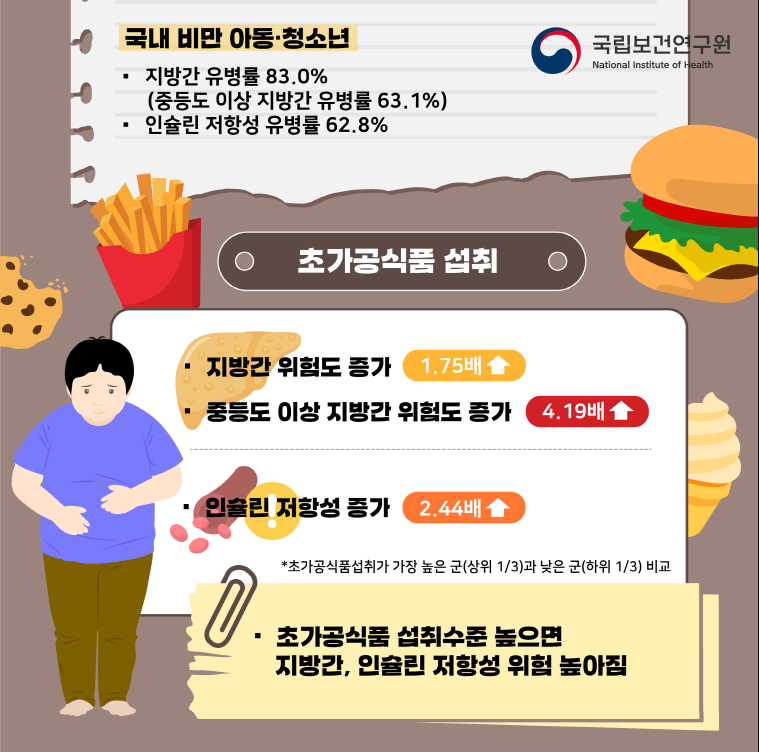Seoul, South Korea – As diets increasingly shift towards convenience-driven options, a new study from the Korea Disease Control and Prevention Agency (KDCA) sounds an urgent alarm: ultra-processed foods (UPFs) are taking a toll on the health of South Korea’s youth, especially those struggling with obesity. This research, spearheaded by the National Institute of Health (NIH) within the KDCA, reveals a concerning link between high UPF consumption and an increased risk of metabolic disorders, including fatty liver disease and insulin resistance. The findings signal a pressing need to curb UPF intake among children and adolescents as a preventative measure against lifelong health issues.
Ultra-processed foods have become a mainstay in modern diets, distinguished by their industrial manufacturing processes and ingredients that maximize shelf life, flavor, and convenience. These foods, classified as Group 4 under the NOVA system, often undergo extensive processing that strips them of essential nutrients such as fiber and vitamins while loading them with preservatives, sugars, and unhealthy fats. Common examples include sugary drinks, fast foods, instant noodles, and packaged snacks, all of which have become ubiquitous in South Korean households. Alarmingly, data from the KDCA reveals that UPF consumption in South Korea has increased significantly, with intake rising from 23.1% in 2010-2012 to 26.1% in 2016-2018. This trend reflects a shift toward more processed diets, paralleling global changes in food consumption patterns.
In the KDCA study, researchers examined the dietary habits of 149 children and adolescents aged 8 to 17, all of whom were classified as obese based on a body mass index (BMI) at or above the 85th percentile. The study employed rigorous methods to assess the levels of UPF intake among participants, cross-referencing it with MRI scans to measure liver health as an indicator of metabolic function. The results, published in the prestigious journal Nutrients, mark a significant contribution to the global understanding of UPFs’ effects on youth health, particularly in populations already burdened by obesity.
The study findings reveal a concerning association between high UPF consumption and heightened risk for metabolic disorders in obese children and adolescents. Participants with the highest UPF intake were found to have a 1.75 times greater likelihood of developing fatty liver disease compared to those with lower UPF intake. Moreover, high UPF consumers faced a 2.44 times increased risk of insulin resistance, a condition that disrupts glucose absorption in cells and, if unaddressed, can lead to type 2 diabetes. The study also highlighted that even incremental increases in UPF consumption could intensify these risks. For every 10% increase in daily UPF intake, the likelihood of developing moderate to severe fatty liver disease rose by 37%, and the risk of insulin resistance increased by 30%. Such findings underscore the cumulative harm of even modest increases in UPF consumption, particularly for overweight youth already at higher risk for metabolic issues.
Ultra-processed foods have long been associated with various health risks in adults, from obesity to cardiovascular disease. For young populations, however, the stakes are exceptionally high. Conditions like fatty liver disease and insulin resistance set the stage for severe, long-term health complications. Fatty liver disease can progressively worsen into nonalcoholic steatohepatitis (NASH) or, in extreme cases, liver cirrhosis, while insulin resistance serves as a gateway to type 2 diabetes, increasing the chances of cardiovascular diseases such as heart attacks and strokes later in life. These risks were reflected in the KDCA study’s participant pool, where 83% of children showed signs of fatty liver disease, and 62.8% displayed insulin resistance. This high prevalence points to a pressing public health issue, suggesting that excessive UPF consumption could fuel a future healthcare crisis unless addressed through preventive action.
In response to these alarming findings, NIH Director Park Hyun-young emphasized the urgent need for reducing UPF consumption among youth as a strategy to protect their metabolic health. Director Park called for proactive measures to limit access to UPFs in both domestic and institutional settings, including schools and childcare facilities, where children and adolescents are especially vulnerable to the lure of these convenient yet harmful food options. Director Park highlighted that an effective strategy requires involvement from families, schools, and public health policies to build environments that support healthier food choices. “Our children’s future health depends on the choices we make today,” Park stated. “Reducing UPF intake is not just an individual responsibility; it is a societal one, requiring coordinated efforts at every level.”
These findings resonate with a growing body of global research linking UPFs with health risks across age groups, and they align with calls from international organizations such as the World Health Organization (WHO) and the United Nations, both of which urge nations to address UPF consumption in children’s diets. As UPF intake continues to rise globally, the KDCA’s research highlights a concerning trend that could have far-reaching consequences if left unchecked. Countries worldwide are increasingly recognizing that the health implications of high UPF consumption extend beyond physical well-being, influencing economic burdens on healthcare systems and affecting overall quality of life. South Korea, by taking a proactive stance, could set an example for other nations grappling with similar public health issues.
The KDCA’s study not only underscores a critical health concern for South Korea but also offers a wake-up call for parents, educators, and policymakers everywhere. By promoting reduced UPF intake and encouraging healthier dietary habits, South Korea can pave the way toward a healthier, more informed future for its youth. Public awareness campaigns, education on healthy eating, and policies aimed at restricting UPF availability are vital steps to curb this growing threat to youth health.
This research has ignited discussions within South Korea and beyond, inspiring further inquiries into the long-term impact of UPFs on health and prompting initiatives aimed at encouraging healthier lifestyles for the next generation. For additional information and access to the study, please contact the KDCA’s Endocrinology and Nephrology Research Department.



